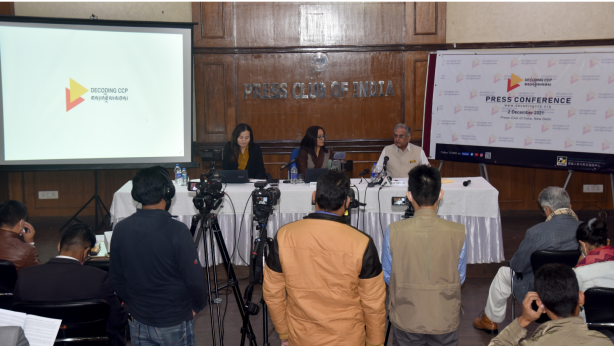TCHRD and Nanda Center host a conference on Tibet: Rights, Reality and the Law
On Wednesday 17 February 2016, a conference on Tibet, “Rights, Reality and the Law” was held in Denver, Colorado. The Tibetan Centre for Human Rights and Democracy (TCHRD) hosted the event with the Nanda Center for International and Comparative Law, the International Law Society, and the Korbel School’s Center on Rights Development.
There were six speakers at the conference divided into two panels. The first panel included Dukthen Kyi, a Tibetan MA candidate at the University of Denver’s Joseph Korbel School of International Relations; John Gaudette, a legal researcher at TCHRD; and Galen Murton, a PhD Candidate in Geography at the University of Colorado. The second panel included Professor Claude D’Estree, a professor at the Korbel School and the first Buddhist Chaplin at Harvard University; Alan Gilbert, the John Evans professor at the Korbel School; and Ved Nanda, a professor at the Sturm College of Law and the founder of its International legal studies program.
Dukthen Kyi’s presentation focused on the self-immolation protests. She began with her personal story and the 2008 protests in Tibet, then discussed the self-immolation protests and the Chinese response. One response was the detention of Tibetans who had no connection to the self-immolators but were detained for trying to spread information about the protests.
John Gaudette’s presentation was on the current situation in Tibet. He highlighted a few issues that are the result of Chinese policies, including death in detention and destruction to the environment.
Galen Murton spoke about his research on the treatment of Tibetans in Nepal. His presentation focused on policies since 2008 that have resulted in restricting rights and public celebrations in Tibet. He mentioned how the People Republic of China’s foreign direct investment in Nepal and other States in the “One Road One Belt” policy had influenced policy in Nepal and caused conditions in Tibet to “flow downhill to Nepal.” Mr. Murton mentioned how fear of spies and restrictions on Tibet public celebrations has resulted in self-surveillance and policing in Tibetan communities in Kathmandu.
Professor D’Estree was the first speaker in the second panel. He began by speaking about genocide in Tibet before discussing his own experiences and the Middle Way Approach. Professor D’Estree described the Middle Way Approach as a pragmatic decision to allow autonomy in Tibet, where the PRC would control only foreign policy and security. In particular, he discussed that the PRC should stop population transfers, respect human rights and restore the environment.
Professor Gilbert’s talk revolved around similarities between policies of ethnic cleansing in the United States, with the treatment of Native Americans, the Holocaust, the Israeli treatment of Palestinians and the PRC’s treatment of Tibetans. Professor Gilbert also agreed with points made by Professor D’Estree about genocide in Tibet and the Middle Way Approach being a wise policy. He also said there was disillusionment in the Tibetan community and that a non-violent movement was necessary.
Professor Nanda made a few points about Tibet in the international community and what other speakers had said. He began by saying that the PRC’s influence had led to the many States refusing to meet with the Dalai Lama. In particular, he noted the refusals of the Norwegian Prime Minister to meet the Dalai Lama, which was the first time a Norwegian Prime Minister had refused to meet a Nobel Laureate, and the United Kingdom’s Prime Minister cancelling a visit to the PRC because no Chinese officials would meet him. As a result of this and other actions, Professor Nanda said that the international community had accepted the PRC suzerainty over Tibet. He also spoke about the importance of solving the Tibet issue and said that it was necessary for relations between India and the PRC to improve.


